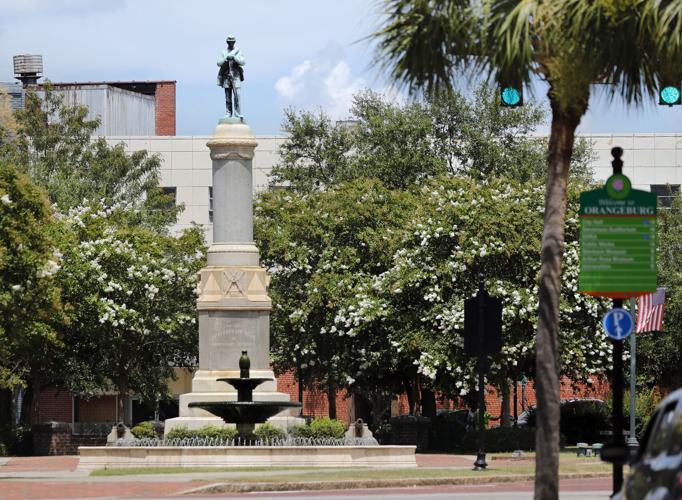COLUMBIA — The South Carolina Legislature continues to have sole authority over any changes to war memorials on public property, but it will no longer take a supermajority vote to alter or remove them, the state Supreme Court ruled Sept. 22.
The unanimous ruling keeps intact the portion of state law commonly called the Heritage Act that says only the Legislature can decide whether to remove or change the name of any building or memorial on public property that commemorates American wars, as well as Native American or African American history.
But it struck down as unconstitutional the requirement that any change get two-thirds approval of the Legislature.
The justices praised the broader 2000 law that included the monument protections as "one of the greatest achievements in the political history of South Carolina — the removal of the Confederate flag from the dome of our Capitol, the seat of government for all our people."
The compromise they're referencing took the Confederate flag off the Statehouse dome and put a smaller, square version beside a monument on the Capitol's front lawn. It made both Martin Luther King Jr. Day and Confederate Memorial Day state holidays. And it required the installation of a monument to Black history on Statehouse grounds, which was dedicated in 2001.
The move followed decades of debate over the Confederate flag since its hoisting on the dome in 1962 to not only remember the Civil War a century later but also as a show of resistance to the civil rights movement. It stayed on the dome, flying underneath the U.S. and state flags, as opposing sides dug in on whether the flag represented the oppression of Black people or recognition of ancestors who fought and died in what the law officially calls the War Between the States.
By 2000, the controversy had reached a "fevered pitch" in the Legislature, with one senator likening the debate to a "war" that made enemies out of former friends, the justices noted in the 22-page ruling.
"After decades of controversy, members who opposed removing the flag from the dome of the Capitol became willing to compromise if given the assurance that doing so would not 'open the floodgates,' and if the renaming and removal of other historic items could be prevented," they wrote.
Since the so-called Heritage Act — a title that's actually nowhere in state law — was needed to accomplish such a grand achievement, it would not be "proper" of the court to deem it unreasonable now, the justices concluded.

Greenville's downtown Confederate monument, located on North Main Street, has been the subject of protests in the past. File/Eric Connor/Staff
However, they called the supermajority requirement an unconstitutional overreach. The legislators of 2000 had no authority to restrict the ability of future legislators to vote by a simple majority, according to the ruling.
The ruling aligns with a non-binding opinion last year from the state's Republican Attorney General Alan Wilson, who thanked the justices "for a very scholarly, well-considered, and well-documented opinion," noting it confirmed his office's analysis.
The two-thirds majority rule has stymied attempts to change memorials.
The last successful attempt was in 2015, when the Legislature voted to remove the Confederate battle flag from Statehouse grounds entirely. The vote came after a white supremacist, seen in photos brandishing the flag, gunned down nine Black people at Charleston's Emanuel AME Church following a Bible study.
A week later, House Speaker Jay Lucas, R-Hartsville, made clear the House would not, as long as he's speaker, revisit amending the Heritage Act to allow any other changes for any reason. He has not wavered from that stance in the years since.
No legislation advocating any change has budged. This year that's included a bill sponsored by an Aiken Republican allowing Aiken County to move a Vietnam War Memorial to the county's Veterans Memorial Park.
After the ruling, Lucas said his position remains the same.
While he's disappointed the court overturned the two-thirds rule, he said, "the opinion makes clear that the General Assembly is the sole authority. I reiterate what I have consistently said since 2015: The South Carolina House of Representatives will not engage in or debate the specifics of public monuments, memorials, state buildings, road names or any other historical markers during my time as speaker."

A family passes the Confederate monument during their walk around The Battery in Charleston on Dec. 17, 2018. File/Staff
Senate President Harvey Peeler said he accepts the court's ruling.
"The protections over all of our state’s monuments and statues were ruled constitutional and they will remain in place," the Gaffney Republican said.
Last year, the statue of John C. Calhoun was removed from his perch in Charleston's Marion Square. But it wasn't covered by the Heritage Act, as the monument honoring the former U.S. congressman, secretary of war and vice president was on private property, according to the opinion issued by Wilson's office. And, while Calhoun was a staunch defender of slavery, he died 11 years before the Civil War broke out in his home state.
Jennifer Pinckney, the widow of slain senator and Emanuel AME Pastor Clementa Pinckney, filed the lawsuit, along with Columbia Councilman Howard Duvall, and former Democratic state Sen. Kay Patterson of Columbia, who retired in 2008 after 34 years in the Legislature.
House Minority Leader Todd Rutherford, who's long criticized the supermajority rule as unconstitutional, said he's disappointed legislators didn't have the court's confirmation of that back in 2015, when it took a lot of wrangling to reach the two-thirds threshold and bring the flag down for good.
The Columbia Democrat said he hopes the ruling leads to cities and colleges having the gumption to pursue changes to buildings and street names.
Last year, the boards of several public colleges voted to ask the Legislature's permission to rename buildings, including Tillman Hall at Clemson and Winthrop universities, named after post-Reconstruction governor and U.S. senator Ben Tillman. While he helped found both colleges, he was also a fervent white supremacist who advocated for the killing of Black people to prevent them from voting.
The boards' requests went nowhere.
Sen. Gerald Malloy, an attorney for the plaintiffs, called the ruling a victory that "sets the blueprint toward fairness and justice.
"While preserving history, the court also ensured change is possible by removing a heightened barrier," the Hartsville Democrat said of the two-thirds requirement. Whether the 2000 law was a great achievement is up for historical debate, he added.
As for Lucas' refusal to take up any changes, Malloy said the ruling answers a legal question, not a political one.
"Now we can go start working on the political issues," he said. "The road to justice is a long one that takes constant care and attention. ... This decision gets us further on our journey."

















